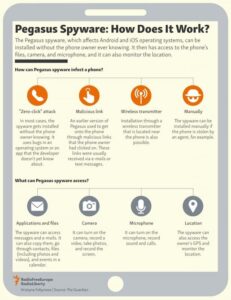As Mossad operations go, this one was technically impressive.
The Taiwan-based company cited as the origin of the pagers has subsequently pointed to a company in Hungary as being where these specific pagers were sent from.
Pegasus is a spyware developed by the Israeli NSO Group, and is designed to be covertly and remotely installed on mobile phones running iOS and Android.

The Israelis define Pegasus as a product for fighting crime and terrorism, but governments around the world are known to have employed the spyware to target journalists, dissidents and activists.
As a case in point, in January 2022, it was indicated that phones belonging to Lama Fakih, a US-Lebanese citizen and senior figure in Human Rights Watch, were repeatedly hacked by a client of the Israeli NSO Group at the time when she was specifically investigating the 2020 Beirut explosion that killed more than 200 people and devastated the Lebanese capital, triggering an economic crisis that the country still hasn’t recovered from.

While this tech-based attack this week is regarded by some as asymmetric warfare, it is also psychological warfare – and arguably not just against Hezbollah or Lebanon.




